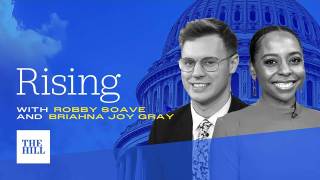Supreme Court won’t take up Trump’s criminal immunity, for now
The Supreme Court declined to take up whether President Trump can be prosecuted for his efforts to overturn the 2020 election, punting for now the question on the limits of presidential immunity as the former president seeks to toss the case.
The refusal, which had no noted dissents, comes as an appeals court weighs a motion from Trump to dismiss the case; he argues he has absolute presidential immunity from criminal prosecution for official acts.
Special counsel Jack Smith’s gambit to skip over an intermediate appeals court and bring the issue directly before the Supreme Court was aimed at keeping the schedule of the trial — the first of Trump’s four criminal proceedings — on track.
While the Supreme Court agreed to expedited briefing over whether to formally take up the matter, the justices ultimately sided with Trump, who argued the case should first be considered by the District of Columbia Circuit Court of Appeals, which scheduled a Jan. 9 hearing.
The justices’ one-sentence order was unsigned and included no explanation.
Though a setback for Smith, the D.C. Circuit’s timeline is particularly speedy. In anticipation of the approaching hearing, Trump is due to submit his written brief tomorrow, and prosecutors are due to respond just before the new year.
In making his case to the Supreme Court, however, Smith noted there was no guarantee when the appeals court may rule on the matter.
And with lower court proceedings stayed while the appeals court weighs Trump’s immunity claims, any delay could mean kicking back a trial otherwise set for March 4 — a dynamic the judge overseeing the matter acknowledged as she paused the case.
“If jurisdiction is returned to this court, it will — consistent with its duty to ensure both a speedy trial and fairness for all parties — consider at that time whether to retain or continue the dates of any still-future deadlines and proceedings, including the trial scheduled for March 4, 2024,” U.S. District Court Judge Tanya Chutkan wrote earlier this month.
Trump’s attorneys argued there was no reason for the Supreme Court to take the case before the appeals court weighed in, arguing speed would undercut consideration in a historic case that requires “more careful deliberation, not less.”
“The Special Counsel identifies no compelling reason for the extraordinary haste he proposes. Instead, he vaguely asserts that the ‘public interest’ favors resolution on a dramatically accelerated timetable, to ensure that President Trump may be brought to trial in the next few months,” Trump’s attorneys wrote in the filing.
“In doing so, he confuses the ‘public interest’ with the manifest partisan interest in ensuring that President Trump will be subjected to a months-long criminal trial at the height of a presidential campaign where he is the leading candidate and the only serious opponent of the current administration.”
Trump’s team similarly opposed any swift consideration of the matter before the appeals court as well, fighting a motion from Smith to expedite the matter.
Beyond the immunity issue, the appeals court will also weigh Trump’s other defense that could tie up the trial schedule: whether the prosecution amounts to unconstitutional double jeopardy.
Trump is charged in the case with four felonies for allegedly conspiring to overturn the 2020 election. Trump pleaded not guilty.
The case is one of four criminal indictments he faces. The former president’s attorney in Georgia, where Trump is also charged over his post-election efforts, has previewed that Trump will also make an immunity argument there.
U.S. District Court Judge Tanya Chutkan, who is overseeing Trump’s D.C. case, declined to dismiss the case based on Trump’s arguments.
“Whatever immunities a sitting President may enjoy, the United States has only one Chief Executive at a time, and that position does not confer a lifelong ‘get-out-of-jail-free’ pass, Former Presidents enjoy no special conditions on their federal criminal liability,” Chutkan wrote in her early December ruling.
Updated 3:17 p.m. Dec. 22
regular post copyright









